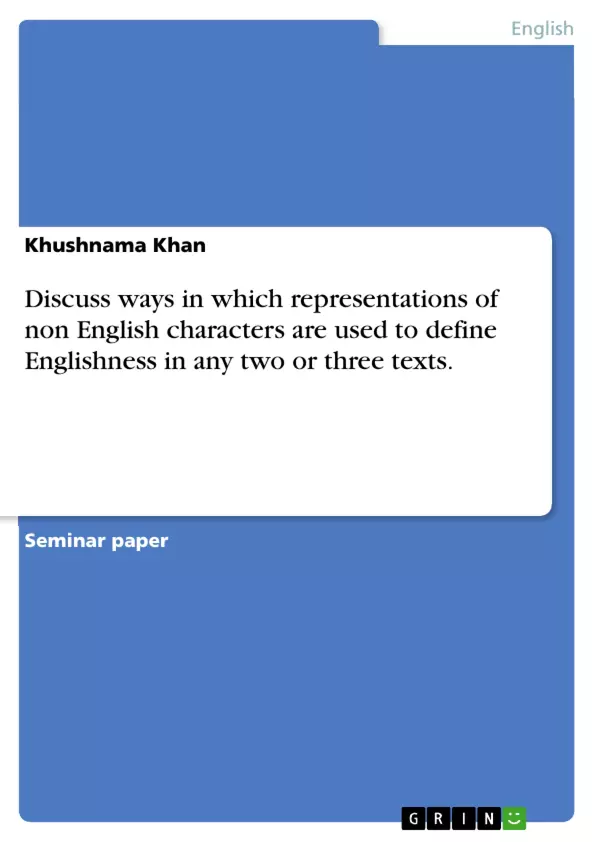Before I begin a discussion on representation of Englishness I think it is important to define what Englishness means in the context of the literary work I intend to use for my discussion. The term Englishness implies many things ranging from notions of nationality, race to class, and a way of life. For the purpose of this essay I will explore the kind of Englishness which is associated with a late Victorian notion of masculinity, Empire, adventure and Englishness in British colonies. In The making of English National Identity Krishnan Kumar traces the history of Englishness; Kumar suggests that ‘English self consciousnesses’ began to emerge when foreign commercial enterprises began to threaten English supremacy in the early 1800s ( p.224, 2003). In this essay I will look at ways in which Englishness is defined by the way non English characters are represented in Rider Haggard’s King Solomon’s Mines and E. M. Forster’s A passage to India. [...]
Inhaltsverzeichnis (Table of Contents)
- Introduction
- Defining Englishness
- Englishness in Rider Haggard's King Solomon's Mines
- Representation of Non-English Characters
- Rationality and Logic
- Masculinity and Whiteness
- Englishness in E. M. Forster's A Passage to India
- The Changing Nature of Englishness
- Anglo-Indian Englishness
- The Character of Aziz
- Missionary Nationalism
- The Role of Good, Sir Henry and Quatermain
- The Tension Between Indians and Anglo-Indians
- The Significance of Whiteness
- Masculinity and Identity
- Conclusion
Zielsetzung und Themenschwerpunkte (Objectives and Key Themes)
This essay explores the representation of Englishness through the portrayal of non-English characters in two novels, Rider Haggard's King Solomon's Mines and E. M. Forster's A Passage to India. The aim is to examine how these representations reflect and define English identity in a historical and cultural context.
- The construction and maintenance of English identity through binary oppositions.
- The evolving nature of Englishness in the late Victorian period and beyond.
- The role of masculinity, rationality, and whiteness in defining Englishness.
- The impact of colonialism and imperialism on English self-perception.
- The representation of non-English characters as "other" and their implications for understanding English identity.
Zusammenfassung der Kapitel (Chapter Summaries)
The essay begins by defining Englishness in the context of the chosen texts, highlighting its association with late Victorian notions of masculinity, empire, adventure, and Englishness in British colonies. It then analyzes how Englishness is defined through the representation of non-English characters in King Solomon's Mines. The natives in this novel are portrayed as superstitious and easily manipulated, highlighting the perceived superiority of the rational and logical English characters. This section explores the role of rationality, logic, and whiteness in constructing English identity in this context.
The essay then moves on to A Passage to India, highlighting the evolving nature of Englishness and the challenges it faces in the post-World War I era. It explores the complex character of Aziz, who represents a different and more nuanced version of Englishness. The essay examines the themes of Anglo-Indian identity, the tension between Indians and Anglo-Indians, and the loss of missionary zeal and spirituality in the English community. The discussion also focuses on the blurring of boundaries between colonizer and colonized, emphasizing the anxieties surrounding inter-marriage and social mixing.
Schlüsselwörter (Keywords)
The key terms and concepts explored in this essay include: Englishness, non-English characters, representation, colonialism, imperialism, masculinity, rationality, whiteness, binary oppositions, Anglo-Indian identity, missionary nationalism, othering, social satire, and cultural decadence.
Frequently Asked Questions
How is Englishness defined in late Victorian literature?
It is often associated with notions of masculinity, rationality, whiteness, and the perceived superiority of the British Empire and its adventurers.
What role do non-English characters play in defining English identity?
Non-English characters often serve as binary opposites (the "other") to highlight the supposed logic and civilization of the English characters.
How does Rider Haggard portray natives in "King Solomon's Mines"?
They are represented as superstitious and easily manipulated, reinforcing the late Victorian image of English rationality and supremacy.
What is unique about the character of Aziz in "A Passage to India"?
Aziz represents a more complex, nuanced version of identity that challenges the rigid boundaries between colonizer and colonized.
What is "missionary nationalism"?
It refers to the idea that Englishness was tied to a moral duty to "civilize" other nations, a concept that Forster’s work shows to be in decline.
- Citation du texte
- Khushnama Khan (Auteur), 2006, Discuss ways in which representations of non English characters are used to define Englishness in any two or three texts. , Munich, GRIN Verlag, https://www.grin.com/document/91132



